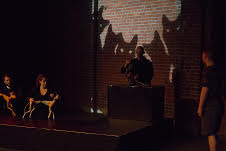In the company of cats, 'Feral Boy' hints at the appeal of cults to the self-isolated
 |
| Corbett confronts feral cats Orangey, Calico, and Striper in Catalyst Repertory show, "Feral Boy." |
Corbett's academically and socially successful college career strikes him as meaningless. Fascinated by a persistent company of feral cats in his neighborhood, he is drawn to learn more. But the creepy obsessiveness of his interest is signaled not by multiply sourced research about undomesticated felines, but by his resorting to the first place most of us turn to nowadays to scratch the curiosity itch: Wikipedia. This bright boy is no scholar, but an obsessive starved for prepackaged sustenance. Wikipedia becomes Corbett's intellectual energy drink, a Bolt out of the blue funk he finds himself in.
I was at the preview performance Wednesday of Catalyst Repertory's production of Bennett Ayres' new play at Wheeler Arts Community. Pat Mullen delivered the tidbits about cats to the audience with a wide-eyed expressiveness that was fully consonant with Corbett's hypnotic attraction to them and frantic quest to join the wild troupe. Balking at maturity, "Feral Boy" is actually no boy at all, but a 22-year-old newly minted college graduate worried about his future, vaguely in the manner of Ben Braddock, Dustin Hoffman's break-through role in "The Graduate."
Where Ben endured a friend of the family stage-whispering "Plastics!" to him as a viable post-graduate career choice, Corbett is facing parental expectation that he will accept an internship to prepare him for a career in Internet advertising. Ayres has charted a much darker course for Corbett, however. It is launched through conversation with three of the feral cats, embodied by scrawny cat puppets cunningly designed by Patrick Weigand and vividly voiced, operated and acted by Matt Anderson, Dane Rogers, and Audrey Stonerock.
Projection of cat silhouettes against the back wall supplements the three-dimensional presentation of the three named cats. Striper (Anderson) is the autocratic boss, Orangey (Rogers) his hostile henchman, and Calico (Stonerock) the vulnerable, compliant female. Opaque to the understanding of most human inhabitants of the urban landscape, the feral cats' ferocity and wildness promise to fill a void in Corbett's life.
To occupy that empty space with daring purpose, he is prepared to shed the accustomed company of loutish frat brothers (played by Matt Walls and Donovan Whitney), ignore increasingly impatient phone messages left by his mother (Sarah Holland Froehlke) and landlord (voiced by Jim Tillett), and exploit and sacrifice a new girlfriend, convenience-store clerk Betsy (Patty Blanchfield). Dennis Forkel plays Crane, the feisty owner of a home aquarium who pays painfully for Corbett's maniacal covetousness. Jolene Moffatt has a hilarious cameo as the automated voice mail at a magazine for cat fanciers.
Under the direction of Zach Stonerock, the players are all nimble, vocally rangy, and attuned to their fingertips to Ayres' nerve-rattling story. The phantasmagoria that animates Corbett's interaction with the cats and with the puzzled humans in his life is cast in powerful, haunting language, which puts forth menacing blooms in the director's and puppet-maker's sound and lighting design.
It remains troubling to consider the progression of Corbett's madness, if that's what it is. I'm not beholden to the analogy with Hoffman's charming Ben Braddock, but it was jarring to find my initial sympathy with Feral Boy's predicament stripped away to its cadaverous remains by the end. Its decline certainly provoked my thoughts about cats, about which I don't have strong feelings, even toward the domesticated kind.
But the idea of meeting serious dissatisfaction with one's life prospects by embracing an outlaw collective with a hierarchical, paramilitary form of organization resonates in the current political atmosphere. I don't want to lose sight of the enduring mystification of cats in our culture, however, which must bear on what Ayres wanted to say with "Feral Boy." Cats have a way of taking over the environments they are accustomed to; there's even a little fun to be noted in this show with their tendency to sweep a paw over any item in their way, knocking it to the floor. They are both commanding and elusive. If cats could paint self-portraits, many of them would choose to display blank canvases.
They play ambivalent roles in common phrases: A cat's-paw is a contemptible dupe, but the cat's meow is something or someone desirable. A catcall used to be an expression of derision, and has lately been repurposed, but not made any more positive, to indicate verbal harassment of women, smugly disguised as crude compliments. And who can explain the cat's pajamas?
Cats can even take over literary settings. Don Marquis' "archy and mehitabel" strikes its rare reader nowadays mostly for the free-verse larkiness of the cat mehitabel ("toujours gai, toujours gai"), which overshadows the dogged cockroach author archy. Nowadays I notice in Carl Sandburg's poem "Fog," which I loved in my early teens, how the cat imagery shoves aside the title subject like a paperweight pawed off a table. Where's the fog? It's all cat. The much more capable poet T.S. Eliot achieves a better metaphorical balance in "The Love Song of J. Alfred Prufrock," with several beautiful lines beginning "the yellow fog that rubs its back upon the window-panes."
Yet the musical "Cats," derived from "Old Possum's Book of Practical Cats," is better-known today to the middlebrow public than any other Eliot poetry: Macavity the Mystery Cat sleeps undisturbed on the chest of J. Alfred Prufrock, who by the way is another young man at his wits' end about any prospect he can really believe in and commit to.
Culturally speaking, cats will never be declawed. A catwalk on the wild side, "Feral Boy" provides a striking reminder of that fact. For the moment, it's the cat's whiskers.
[Photo by Gary Nelson]



Comments
Post a Comment